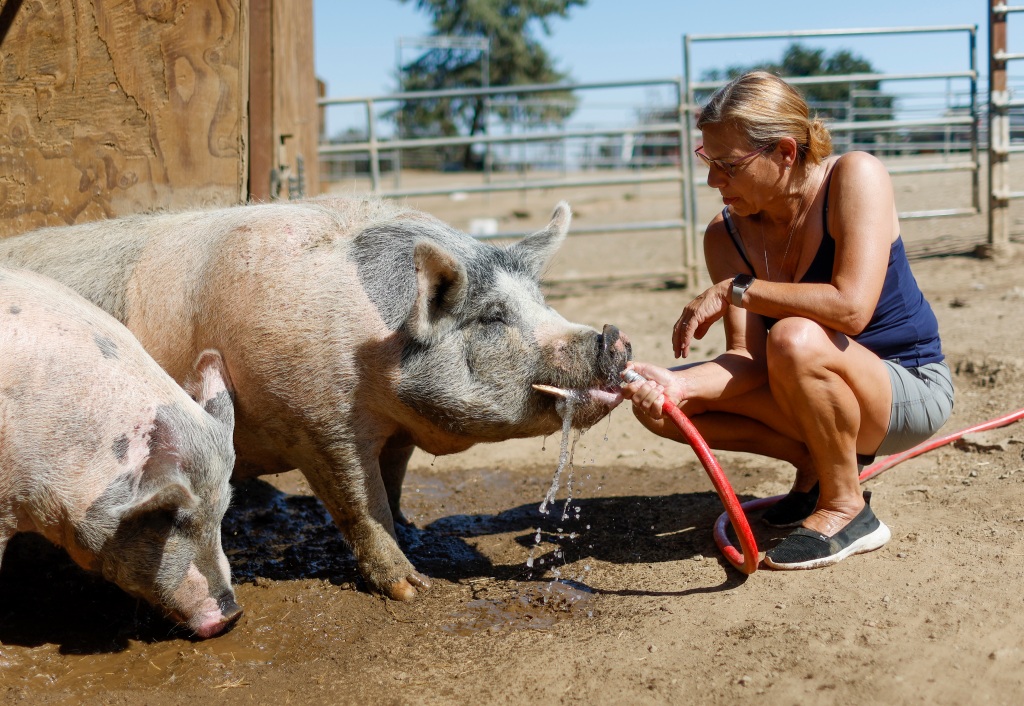- September 10, 2022
- No Comment
- 8 minutes read
Heat wave: Bay Area farm animal owners have to get creative to keep cool – The Mercury News

Today's e-Edition
Get Morning Report and other email newsletters
Get Morning Report and other email newsletters
Today's e-Edition
Trending:
The staggering, oppressive heat wave that has brought the Bay Area to its knees has caretakers of farm animals getting creative in their efforts to keep their charges relatively cool.
Most farm animals don’t have the luxury of escaping the heat inside air conditioned barns, coops or houses. Instead, they rely on shade, plenty of water and whatever methods humans can think of to ease the pain.
Sheila Murphy, who owns Alma Bonita Animal Rescue in Morgan Hill, has started putting ice in her pigs’ mud puddles, which the pigs find delightful. Her horses are a bigger concern.
“Our horses don’t enjoy getting hosed down, so we’ve had to get creative,” Murphy says.
Murphy and caregivers are soaking towels in cool water to drape on the horses and feeding them frozen carrots.
“If we can’t cool them down on the outside, we’re trying to cool them on the inside,” she says. “Ice in their water has been a godsend, but today, we can’t find any ice.”
Caregivers and even the office staff at Animal Place, a farm animal sanctuary in Grass Valley, are making hourly checks on the more than 300 animals in their care, looking for signs of heat distress. The classic sign: open mouth breathing.
Kimberley Sturla, sanctuary executive director and cofounder, says they have invested heavily in swamp coolers — units that take advantage of evaporative cooling — which they’re running around the clock to cool down the barns.
Sturla says they have a lot of oak trees for shade, and they use hoses and misters to provide some relief for animals outside the barns. The most at risk, she says, are the pigs, turkeys, some chicken breeds and rabbits, none of which seem to tolerate the high heat very well.
On the other hand, Sturla says, the cows, goats and donkeys are coping fairly well in the heat. Some of the cows will even seek out the sun, and Murphy says she has an alpaca who spends almost all day basking in the sizzling rays of the sun.
Oakland Zoo animals have been suffering, too. Erin Harrison, communications vice president at the 100-year-old zoo, says animal keepers have been filling kiddie pools with cool water and ice, using water misters and sprays, and making special, giant ice pops from frozen, watered-down juice, coconut milk and Gatorade.
California’s State Veterinarian, Dr. Annette Jones, says shade and water are the two most vital requirements for any animal enduring the heat.
Shade is essential, she says, but closed structures must also include good ventilation.
Water, too, is important, Jones says, but people should be aware that water sitting in the sun in heat like this can get too hot. Jones recommends flushing hoses and waterlines in the late afternoon and providing shade over the water source. Large troughs do OK in the sun, she says, but small bowls and drippers get too hot, too fast. If your animals depend on well water, she says, it’s best to have a back-up plan in case you lose power.
For dogs and pet pigs, a plastic kiddie pool set in the shade works well for cool-down dips, Jones says. And misters and fans help outdoor animals stay cool, although their use should be balanced with the need to conserve electricity.
For poultry, it may be necessary to increase ventilation by opening all the doors and windows in their roosts on nights when it just doesn’t cool down much. Consider adding a fan, too, Jones says.
Domesticated animals aren’t the only ones suffering in the heat, but Ken Paglia, with the California Department of Fish and Wildlife, says we shouldn’t do anything extraordinary to help wild creatures.
“First and foremost, please do not leave food and water out for wildlife,” Paglia says. “Most people have the best intentions when they do this, but in most cases, ‘problems’ with wildlife occur as a direct result of people feeding them and even providing sources of water. Animals learn to associate humans with a food-reward and expect that reward from every human they encounter.”
Attracting or keeping wildlife around homes and developed neighborhoods, Paglia says, even rural properties, increases their chances of being hit by vehicles or getting trapped and tangled up in all sorts of home-related dangers, from chicken feeders to volleyball nets, discarded fencing and hammocks.
Paglia also warned motorists to be even more cautious in this heat wave and look out for wildlife trying to cross highways in search of water or food.
Buffy Tarbox-Martin, communications manager for the Peninsula Humane Society and SPCA, says not to forget about pets, especially those that spend most of their days outside. If possible, they should be brought indoors during this heat wave.
Provide ample shade for outdoor pets, Tarbox-Martin says, and plenty of cool, fresh water for both indoor and outdoor pets. Adding a few ice cubes to their water dish can help.
She recommends limiting daily walks to the early mornings or late evenings, when temperatures usually are cooler, and to avoid walking on hot pavement. If you wouldn’t walk barefoot on it, she says, you shouldn’t force your dog to. And never leave pets in parked cars.
We invite you to use our commenting platform to engage in insightful conversations about issues in our community. We reserve the right at all times to remove any information or materials that are unlawful, threatening, abusive, libelous, defamatory, obscene, vulgar, pornographic, profane, indecent or otherwise objectionable to us, and to disclose any information necessary to satisfy the law, regulation, or government request. We might permanently block any user who abuses these conditions.
Get Morning Report and other email newsletters
Copyright © 2022 MediaNews Group

